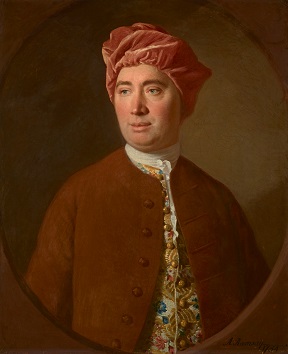Liberty Matters
Hume’s Philosophical Narrative of Liberty
 What follows is a response to Chandran and Mark and reinforces, I think, Dan's point about mere liberty and natural jurisprudence.
What follows is a response to Chandran and Mark and reinforces, I think, Dan's point about mere liberty and natural jurisprudence.Following the collapse of the medieval Aristotelian teleological worldview, the word "nature" no longer described the fully developed but primitive condition of mankind. This is what subsequent thinkers, including the natural jurisprudence tradition, recognized. In Hobbes and in Hume this became the extra-political condition. The extra-political condition is one of individual liberty (or "mere" liberty in Dan's sense).
This extra-political condition never disappears. The state of nature in Hobbes is not an historical event but a description of what happens following the collapse of authority in a revolution, hence the need to avoid revolution. Hume also acknowledges an extra-political condition in several ways. Since legitimacy is always a matter of acquiescence and opinion, legitimacy can disappear. Hume was as much concerned to avoid revolution as was Hobbes. In addition, governments should always assume that men might do bad things (Tory view).
Revolutions, understandably, may sometimes be okay. However, there cannot be an authoritative revolution or theory of revolution – this merely changes the locus to something else that might be contestable. Besides, such an account (as in Locke) is dangerous because it can foment revolution.
There is, thus, more continuity between Hobbes and Hume than is generally acknowledged. Hume criticized Hobbes because of the perceived inadequacy of Hobbes's account. Hobbes's account is potentially destabilizing in Hume's view because of its psychological egoism. That is why limited benevolence and sympathy become important for Hume as well as Smith.
The extra-political condition consists of our interests (individual liberty) but more precisely of how we understand our interests: "though men be much governed by interest; yet even interest itself, and all human affairs are entirely governed by opinion" (E-BG 51). Opinion is our passions subtended by reason. Opinion is not a theory (which is why traditional political theorizing is bogus if not dangerous [Hayek and Oakeshott?]) but a narrative. My conception of my interest is a function of my conception of my personal identity, which is the product not only of a train of memories but the story I tell of myself. Analogously, what governs society is a narrative of how we understand our society and its history; hence the importance of getting the narrative correct – this is why Hume writes the History.
Given the extra-political condition and the need to remind people about the destructiveness of revolution, a correct narrative does not follow a carefully laid-out script. The narrative needs to show the "bad" as well as the "good."
What is the "good"? Within the narrative we can extract norms from previous practice even in the face of the persistent violation of those norms; we ask, do certain norms persist over time and even evolve (conservative element)? Hume's History is just such a narrative, without denying the warts, of how specific constitutional arrangements (balance the executive and legislative branches; legal safeguards in particular are a special part of the history of England in anybody's retelling) developed over time. This is the destination that Mark identifies (civil and political liberty, rule of law). It also becomes important to contest rival narratives (both Whig and Tory): Hume focuses on how they misrepresent specific events to fit a present preferred policy. The narrative only makes sense if the legal safeguards of individual ("mere" or extra-political) liberty explain why we do not (yet) need to revert to the extra-political condition.
The test of the adequacy of Hume's narrative is whether it rings more or less true: (a) like a legal brief, we ask if it gives a consistent and coherent account of the precedents; (b) we ask if it will keep the polity going; (c) in retrospect, we note that England somehow managed to muddle through, as opposed to serial revolutions in France provoked by erasing the past in favor of misguided theory.
Hume does not pretend that his narrative can produce an algorithm or predict future permutations. Individual liberty will always have to be defended. The case for liberty will always have to be restated in the face of new circumstances. One of the strengths of the English intellectual inheritance (from Ockham to Oakeshott) is that it keeps individual liberty (the extra-political is always subtly in the background) front and center; that same inheritance is always skeptical of abstractions. That inheritance attracts like-minded people from Montesquieu to Polanyi and Hayek.
The greatest intellectual threat to continuity in the present is the Enlightenment Project belief (blame the French and Bentham) in a social technology (rationalism); it too, ironically, has an anti-historical dismissive narrative of why we should ignore pre-positivist thought – begin with an alleged clean slate; all the more reason for us to give a narrative account of previous intellectual traditions while engaging (for us) polite rival versions.
Copyright and Fair Use Statement
“Liberty Matters” is the copyright of Liberty Fund, Inc. This material is put on line to further the educational goals of Liberty Fund, Inc. These essays and responses may be quoted and otherwise used under “fair use” provisions for educational and academic purposes. To reprint these essays in course booklets requires the prior permission of Liberty Fund, Inc. Please contact oll@libertyfund.org if you have any questions.